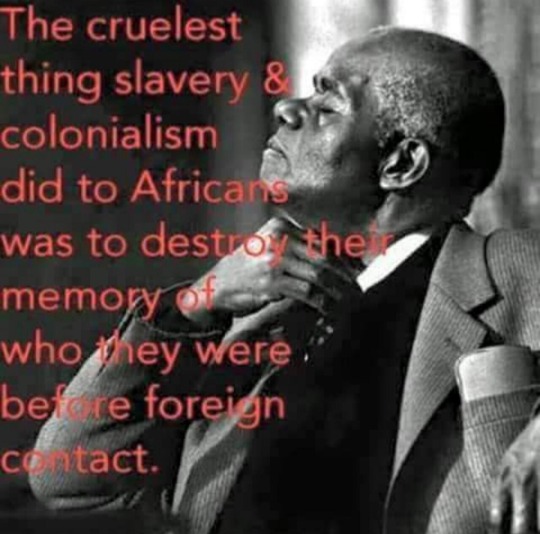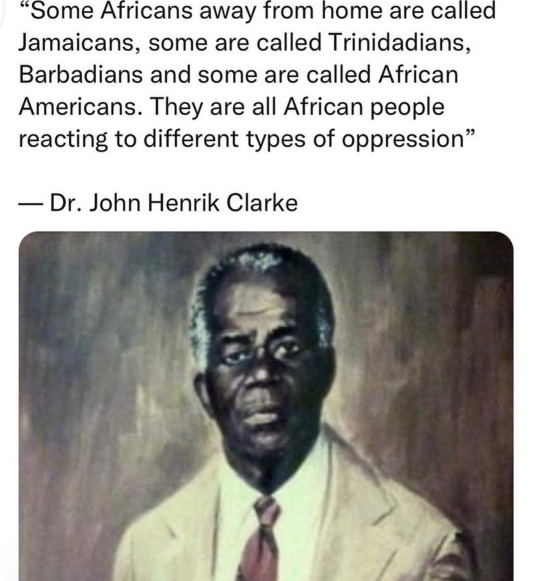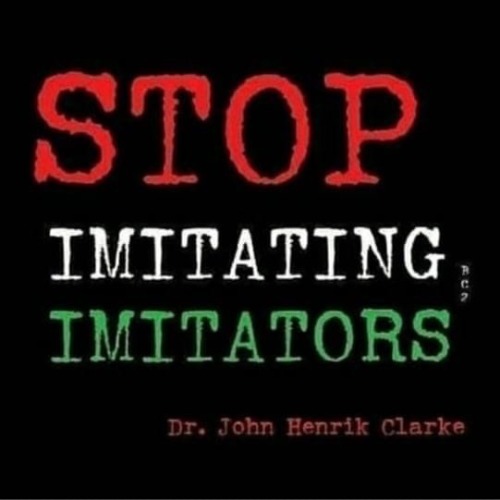#John Henrik Clarke
Text
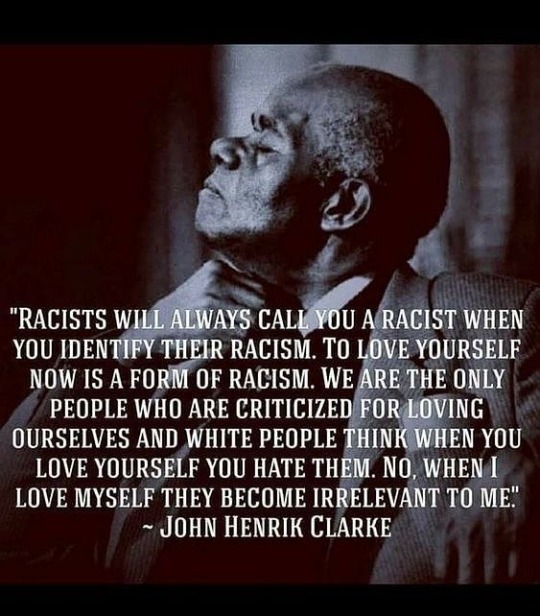
160 notes
·
View notes
Text
#john henrik clarke#black power#knowledge#religious#religion#african#black knowledge#self knowledge#black history#black spirituality#spirituality#spiritual
256 notes
·
View notes
Photo
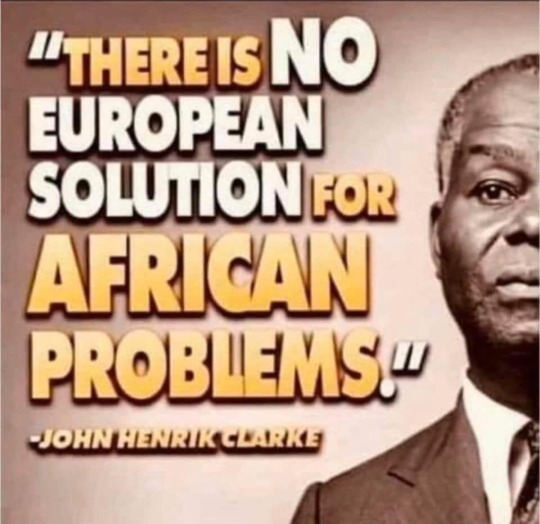
41 notes
·
View notes
Text
Collected Writings Of: John Henrik Clarke - FREE Download on Z-Library
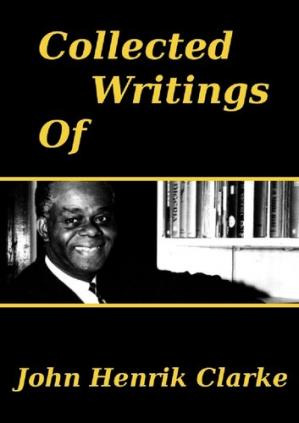
John Henrik Clarke papers 1937-1996
Consisting mainly of correspondence, lecture notes, course outlines, writings, research material, organizational records and printed matter, the John Henrik Clarke papers are a unique archive for the study and interpretation of African and African-American history during the second half of the 20th century. As a sergeant-major in a segregated unit in Kelly Field, Texas, during World War II, Clarke helped train African-American enlisted men for mess and other maintenance duties. The collection partially records the lives of these men, changes in their personal and military status, and disciplinary procedures against them.
Biographical/historical information
Born in 1915, the oldest son of an Alabama sharecropper family, John Henrik Clarke was a self-trained historian who edited and wrote over thirty books, and was a leading figure in the development of African heritage and black studies programs nationwide.
He was a co-founder of the Harlem Quarterly (1949-1951) and an associate editor of the journal Freedomways. During the 1960s, he served as director of the African Heritage unit of the anti-poverty program Harlem Youth Opportunities Unlimited (HARYOU-ACT), and as special consultant and coordinator of the Columbia University-WCBS television series "Black Heritage."
He joined the Department of Black and Puerto-Rican Studies at Hunter College in 1969. The founding president of the African Heritage Studies Association, he was a consultant to many projects, including the Metropolitan Museum of Art's exhibition "Harlem On My Mind" and the Portal Press Springboards series, "The Negro in American History." He was awarded the Phelps-Stokes Fund's Aggrey Medal in 1994 for his role "as a public philosopher and relentless critic of injustice and inequality." John Henrik Clarke died in 1998.
Scope and arrangement
Consisting mainly of correspondence, lecture notes, course outlines, writings, research material, organizational records and printed matter, the John Henrik Clarke papers are a unique archive for the study and interpretation of African and African-American history during the second half of the 20th century. As a sergeant-major in a segregated unit in Kelly Field, Texas, during World War II, Clarke helped train African-American enlisted men for mess and other maintenance duties.
The collection partially records the lives of these men, changes in their personal and military status, and disciplinary procedures against them.|||The author's voluminous correspondence is both personal and professional. Significant correspondents include Julian Mayfield, J.C. de Graft-Johnson, Adelaide Cromwell, Basil Davidson, Cheikh Anta Diop, Hoyt Fuller, Richard B. Moore, John G. Jackson, Ezekiel Mphahlele, Alice Walker, Elliott Skinner, E.U. Essien-Udom, Robert E. Lee, Calvin and Eleanor Sinnette, Alioune Diop and the editors of Presence Africaine, and L.H. Ofosu-Appiah of the Encyclopedia Africana project.
The bulk of the correspondence is arranged chronologically.|||Curriculum material in the collection ranges from African history outlines developed in the 1960s for the HARYOU-ACT Heritage program and the Timbuctoo Learning Center, to core black studies courses at Hunter College, Cornell University, the New School for Social Research and Rider College in New Jersey.
The lecture notes (1954-1979) are supplemented by conference material and other printed matter. The HARYOU-ACT series consists of academic and administrative files of the Heritage program, which was administered by the Community Action Institute, HARYOU's central training and orientation department.|||
The Editing and publishing series consists of correspondence, manuscripts, reviews, research material and printed matter for the following books and publishing projects: "Malcolm X, the Man and His Times," "William Styron's Nat Turner: Ten Black Writers Respond," "The Black Revolution, USA," "Anthology of American Negro Short Stories," "Harlem, USA," "Marcus Garvey and the Vision of Africa," the Columbia University-WCBS-TV series "Black Heritage," and the magazine Freedomways. The Garvey files include substantive correspondence with Amy Jacques Garvey.
The Freedomways material relates in part to special issues edited by Clarke on Harlem, the Caribbean and the life of W.E.B. DuBois. Unfinished projects range from "A Treasury of American Negro Humor" (1957) to "Tales of Harlem" (1969) and a life of Patrice Lumumba. Clarke's own writings in this collection consist of early drafts of "Africa Without Tears," a book of travel writing; "Journey to the Fair," an early novel of hobo life; a compilation of short stories, and several files of articles and essays.
The bulk of the author's writings are part of a posthumous addition to the collection.|||The main organizations represented in the collection are the African Heritage Studies Association, founded in 1968 when black scholars walked out of the African Studies Association and the Universal Ethiopian Student Association, a Harlem-based nationalist group opposed to the 1930s Italian invasion of Ethiopia. Other files relate to the African Heritage Exposition of 1959, the American Society for African Culture, 1959-1963, the Fair Play for Cuba Committee, 1960, the Afro-American Scholars Council, 1972-1979, and the Schomburg Center for Research in Black Culture, 1970-1990.
Also included are correspondence and writings by Shaleak ben Yehuda of the Original Hebrew Israelite Nation of Jerusalem, a community of African-American Jews facing deportation from Israel in the 1970s, and correspondence and publications related to Jacob Carruthers and his Association for the Study of Classical African Civilizations.|||
The collection is also the site of a number of outstanding unpublished manuscripts by authors like Yosef Ben-Yochannan, Frank Chapman, Jr., Lionel Hutchinson, Edward S. Lewis, Charles Seifert and John G. Jackson.
There are also transcripts and other material from various African and Caribbean conferences. Also included are consultancy files for the exhibition "Harlem On My Mind," the Carver Federal Savings bank, and printed matter on Kwame Nkrumah, black nationalism, the 1978 Jonestown massacre in Guyana, as well as other subjects.
The John Henrik Clarke papers are arranged in fourteen series:
Personal Papers
World War II
Correspondence
Lecture Notes
Course Outlines
HARYOU-ACT
Editing and Publishing
Writings
Organizations
Consultancy
Subject Files
Other Authors
Oversized Documents
Restricted File
Administrative information
Source of acquisition
Gift, Dr. John Henrik Clarke, 10/1994 and 1999.
12 notes
·
View notes
Text
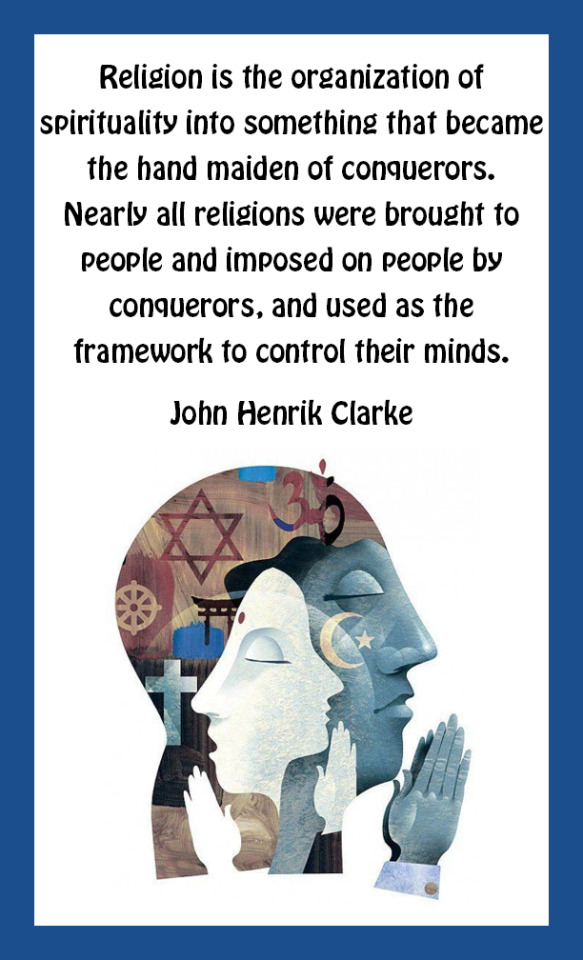
4 notes
·
View notes
Video
youtube
The Pope Orders The Slave Trade- Dr John Henrik Clarke
#catholic church#slavery and the catholic church#The Pope Orders The Slave Trade- Dr John Henrik Clarke#Dr John Henrik Clarke#white lies#white supremacy#pope nicholas v#portugal#spain#white historical genocides
42 notes
·
View notes
Text
Obituary of John Henrik Clarke
Originally posted to Lucumi by Runoko Rashidi, we present the obituary of John Henrik Clarke. The complete original can be found at http://web.archive.org/web/20041014213827/http://www.cwo.com/~lucumi/clarke3.html
THE GLOBAL AFRICAN COMMUNITY
H I S T O R Y N O T E S
JOHN HENRIK CLARKE’s AUTOBIOGRAPHICAL OBITUARY
By DR. JOHN HENRIK CLARKE
Posted by RUNOKO RASHIDI
Posted by NEWS SERVICEJuly…
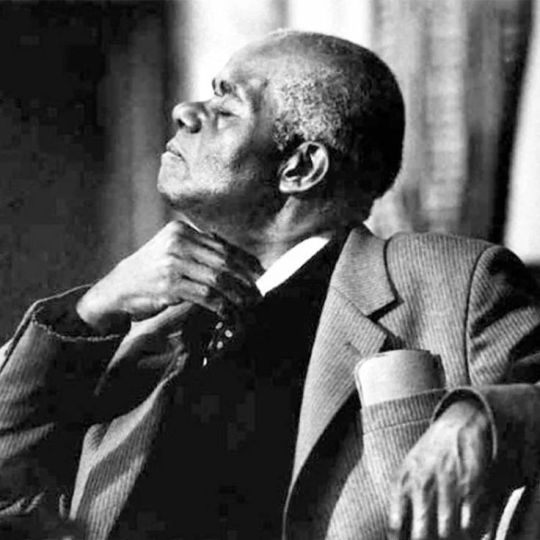
View On WordPress
5 notes
·
View notes
Text
173 notes
·
View notes
Photo
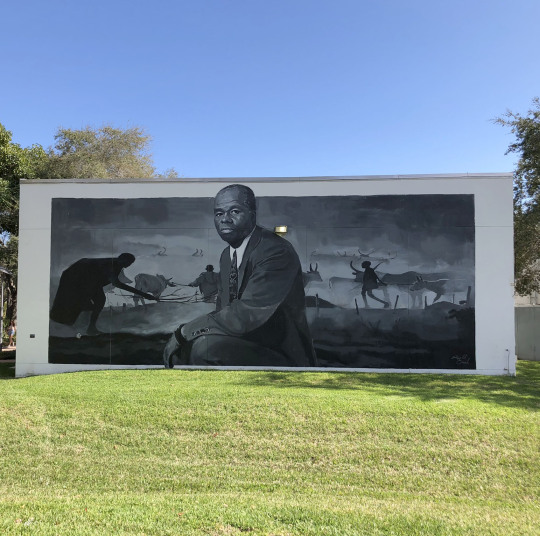
“History is not everything, but it is a starting point. History is a clock that people use to tell their political and cultural time of day. It is a compass they use to find themselves on the map of human geography. It tells them where they are but, more importantly, what they must be.”- Dr. John Henrik Clarke
Dr. John Henrik Clarke was an American writer, historian, professor, and pioneer in the creation of Pan-African and Africana studies. He taught at both Hunter College in NYC, where he established the Department of Black and Puerto Rican studies, and Cornell University where he was the Carter G. Woodson Distinguished Visiting Professor of African History at Cornell University’s Africana Studies and Research Center.
The mural pictured above, Dr. John Henrik Clarke and the Mundari Tribe by Reginald O’Neal, was created for the 2022 edition of SHINE Mural Festival in St. Petersburg, Florida.
#reginald o'neal#dr. john henrik clarke#black history month#st. pete murals#shine mural festival#africana studies#history#quotes#florida artist#painting#art#shine mural festival 2022
9 notes
·
View notes
Photo
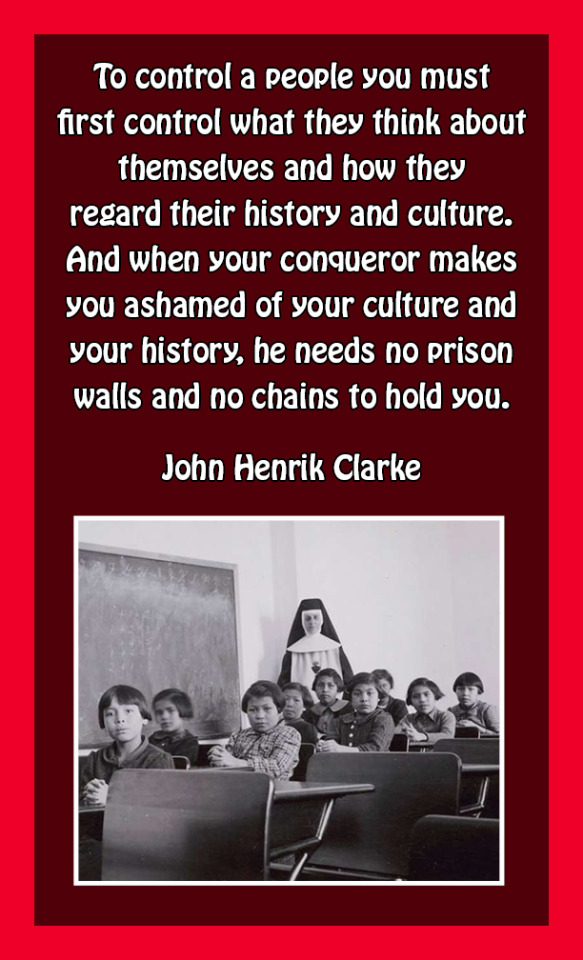
#quotes#John Henrik Clarke#to control a people#control what they think#history#culture#ashamed of your culture#truth and reconcilliation
1 note
·
View note
Text
Post: #MalcolmX #John #Henrik #Clarke #Yosef...
#MalcolmX #John #Henrik #Clarke #Yosef #BenJochannon #Claud #Anderson #Assata #Shakur #Frances #Cress #Welsing #Shahrazad #Ali #Sara #Suten #Seti #Khalid #Abdul #Muhammad #Alton #Maddox #Johnnie #Cochran #Olu #Stevens #Marcel #Dixon #Fred #Hampton #Kwame #Ture #Stokely #CarMichael #Jamil #Abdullah #alAmin #HRap #Brown #Minister #Louis #Farrakhan #Rizza #Islam #George #Jonathan #Russell #Maroon #Shoatz #Albert #Woodfox #Sundiata #Acoli #Joseph #Brown #Veronza #Bowers #Mutulu #Shakur #Imam #Jamil #Abdullah #AlAmin #Ed #Poindexter #Fred #Burton #Lester #Jackson #Huey #Newton #Mumia #Abu #Jamal #Denmark #Vesey #Jeffrey #Khatari #Gaulden #John #White #Micah #Xavier #Johnson #Othal #Ozone #Wallace #Kenneth #Walker #Richard #Strickland #Sipho #Bennett https://www.blaqsbi.com/5nh2
0 notes
Text

HOW MANY OF YOU KNEW THIS ABOUT BROTHER WESLEY?!
Snipes formed a production company, Amen-Ra Films, in 1991 and a subsidiary, Black Dot Media, to develop projects for film and television.
AMEN RA PRODUCTIONS PRODUCED ALL OF THE HIGHLY SUCCESSFUL (AND LUCRATIVE) BLADE MOVIES
Snipes has been training in martial arts since age 12, earning a 5th dan black belt in Shotokan Karate and 2nd dan black belt in Hapkido.
In the late 1990s, Snipes and his brother started a security firm called the Royal Guard of Amen-Ra, dedicated to providing VIPs with bodyguards trained in law enforcement and martial arts. In 1996, the first film produced by Amen Ra productions was A Great And Mighty Walk – Dr. John Henrik Clarke, in which Snipes narrated.
In 2000, the business was investigated for alleged ties to the United Nuwaubian Nation of Moors. It emerged that Snipes had spotted 200 acres (0.81 km2) of land with the intention to buy and use for his business academy, which were close to the compound in Putnam County, Georgia. Both Snipes' business and the groups used Egyptian motifs as their symbols. Ultimately, Snipes and his brother did not buy the land, instead establishing their company in Florida, Antigua, and Africa.
Snipes, who was raised a Christian, converted to Islam in 1978, but left Islam in 1988. During a 1991 interview, Snipes said "[Islam made] me more conscious of what African people have accomplished, of my self-worth, [and gave] me some self-dignity."
615 notes
·
View notes
Text
THE AFRICAN INVITED THE EUROPEAN FOR DINNER
That’s the first thing he did. The Indians invited the Europeans for dinner. The Polynesians invited the Europeans for dinner. Now, if you invite people for dinner, you first place, you’ve got plenty of dinner, and you have a society that is traditionally hospitable to strangers. The Indian youngs invited Christopher Columbus for dinner.
The first thing they did. All right, now let’s look at what was happening inside of Christopher Columbus’s mind, and we can go to his own diary for this. He said I wonder why they are so friendly. They’ll be easier to conquer than I thought they would be. I wonder why they’re bringing such small amounts of gold. I wonder where the mines are. His intentions were
not good. It wasn’t good then. The intentions are not good now. And the black man is still hung up with this dinner invitation, this kindness, with the thought that if you treat a person humanely, that he would act humanely toward you. Black people have not seen white people at all.
That is why they can’t deal with them.
Dr John Henrik Clarke speaks 🗣
171 notes
·
View notes
